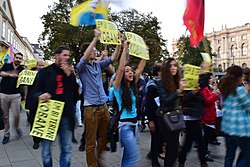 |
|---|
The foreign relations of Rojava are the external relations of the Autonomous Administration of North and East Syria (AANES). The AANES, consisting of three regions (Afrin, Euphrates and Jazira), was formed in early 2014 in the context of the Syrian Civil War, a conflict that has caused the involvement of many countries and international organizations in the area.
Contents
- Foreign relations of the Autonomous Administration of North and East Syria
- Relations with international civil society
- Relations with international organisations
- Relations with UN member states
- Foreign relations of the regions of North and East Syria
- Jazira Region
- Euphrates Region
- Afrin Region
- See also
- References
The Constitution of North and East Syria, which defines the autonomous region as an integral part of Syria and not a separate country, states that "the Autonomous Regions shall not interfere in the domestic affairs of other countries, and it shall safeguard its relations with neighboring states, resolving any conflicts peacefully." It also mandates, among other executive council bodies, a Body of Foreign Relations. [1]






